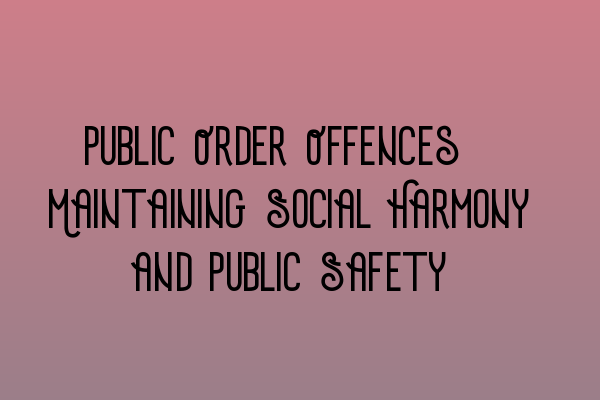Public Order Offences: Maintaining Social Harmony and Public Safety
Public order offences play a crucial role in maintaining social harmony and public safety within our society. These offences are designed to protect individuals and communities from behaviors that may disrupt peace, order, and tranquility. Understanding the different categories of public order offences and their implications is an essential part of criminal law practice.
What Are Public Order Offences?
Public order offences encompass a wide range of actions and behaviors that are deemed to be disruptive, disorderly, or offensive in public spaces. These offences include but are not limited to:
- Public drunkenness or intoxication
- Disorderly conduct
- Rioting
- Violent or threatening behavior
- Harassment or intimidation
Public order offences can occur in various settings, such as public streets, parks, pubs, or even online platforms. Any behavior that poses a threat to public safety, peace, and tranquility can be considered a public order offence.
The Importance of Maintaining Social Harmony
Social harmony is vital for the well-being and cohesion of a community. When public order is disrupted, it can lead to fear, anxiety, and a breakdown in community relations. By tackling public order offences, the criminal justice system aims to restore and maintain social harmony.
Public order offences not only affect individuals directly involved but also have an impact on the broader community. They can undermine public trust, create an environment of fear, and hinder social interactions. By upholding laws related to public order, the criminal justice system helps create a safe and secure environment for all members of society.
Understanding the Legal Implications
Public order offences are taken seriously by the legal system, and those found guilty may face severe consequences. Convictions for public order offences can result in fines, community service, probation, and even imprisonment, depending on the gravity of the offense.
As a solicitor specializing in criminal law, it is essential to familiarize yourself with the legal intricacies of public order offences. By understanding the nuances of these offences, you can provide effective legal representation to your clients and ensure a fair trial process.
SQE Criminal Law & Practice Preparation
Preparing for the SQE Criminal Law & Practice assessment requires comprehensive knowledge of various areas of law, including public order offences. If you are looking for practice materials to enhance your understanding, we recommend checking out our related articles:
- SQE 1 Practice Exam Questions
- SQE 1 Practice Mocks FLK1 FLK2
- SQE 2 Preparation Courses
- SQE 1 Preparation Courses
- SRA SQE Exam Dates
These resources will provide you with valuable study materials, mock exams, and courses to help you excel in the SQE Criminal Law & Practice assessment.
Conclusion
Maintaining social harmony and public safety is a collective responsibility, and public order offences play a significant role in achieving this goal. As legal professionals, it is crucial to understand the implications of these offences and provide effective representation to clients involved in such cases.
At SQE Criminal Law & Practice Law UK, we are committed to helping aspiring solicitors prepare for the SQE assessments. With our comprehensive preparation resources and courses, you can enhance your knowledge and skills in criminal law. Visit our website today to explore our offerings and take your career to new heights.
